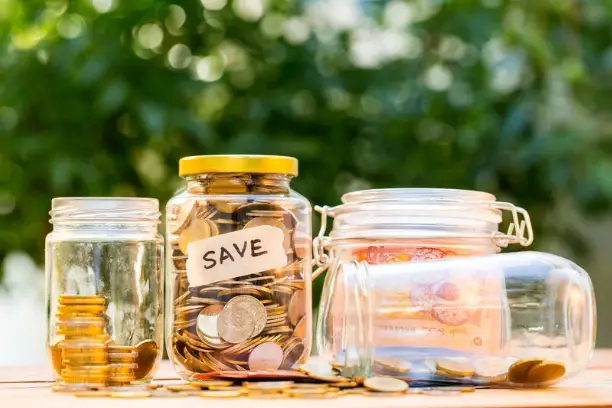We all want to live comfortably, but sometimes our spending habits can get in the way of our financial goals. Whether it’s indulging in our guilty pleasures or justifying a few too many purchases, our wallets can take a hit without us even realizing it.
That’s where cutting expenses comes in. By simply being mindful of our spending habits, we can save money and reach our financial goals faster. In this blog post, we’ll explore 10 things you can stop buying to save money fast. From subscription services to bottled water, I’ll provide alternative options that are both budget-friendly and eco-friendly. So grab your reusable water bottle, sit back, and let’s start saving some money!
I. Subscription Services
Subscription services can be a real drain on our bank accounts. From streaming services to meal kits, these recurring charges can add up quickly without us even noticing.
Here are a few things to consider cutting back on:
- Streaming Services: While it’s tempting to subscribe to every streaming service under the sun, it can quickly become expensive. Consider which services you use the most and which ones you can live without. You can also look into sharing a subscription with a friend or family member to split the cost.
- Meal Kit Delivery: While meal kit delivery services can be convenient, they can also be pricey. Instead of relying on them for all of your meals, try meal prepping at home or finding easy, budget-friendly recipes to make.
- Beauty Boxes: Beauty boxes contain a variety of beauty products that are delivered to your door on a regular basis, often for a monthly fee. While beauty boxes can be a fun way to try out new products, they can also be expensive and lead to clutter. Instead, try buying full-sized products you know you love or swapping samples with friends.
Cutting back on your subscription services can help you save some money each month with minimal compromise on comfort and entertainment. Moreover, you might discover that you don’t even miss those extra luxuries as much as you thought you would!
II. Bottled Water
Bottled water is a convenience that many of us have grown accustomed to, but it comes with a hefty price tag and environmental impact.
Here are a few things to consider when it comes to cutting back on bottled water:
- Cost: Buying bottled water can add up quickly, especially if you’re buying it daily or multiple times a day. Instead, invest in a reusable water bottle that you can fill up at home or at public water fountains. You’ll save money in the long run and reduce your carbon footprint.
- Environmental Impact: The plastic bottles used for bottled water take hundreds of years to break down, and many end up in landfills or our oceans. By using a reusable water bottle, you can significantly reduce your waste and help protect our planet.
- Quality: While bottled water may seem like a cleaner option, it’s often not much different than tap water. In fact, many bottled water brands simply package tap water and sell it at a premium. By investing in a quality reusable water bottle and using tap water, you can get the same quality at a fraction of the cost.
Reducing your reliance on bottled water may take some adjusting to, but it’s a small step that can have a big impact on both your wallet and the planet. So ditch the plastic and grab a reusable water bottle – your bank account and the environment will thank you!
III. Brand Name Products
While brand name products may offer a certain level of prestige, they often come with a higher price tag. In many cases, the increased cost of brand name products is due to marketing and branding expenses rather than the actual quality of the product. As such, choosing generic or store-brand alternatives can often provide comparable quality at a much lower cost.
Here are some key considerations to keep in mind when looking to reduce your reliance on name products:
- Price: Brand name products are often more expensive than generic or store-brand products. While it’s tempting to opt for the brand name, consider trying the generic or store-brand alternative. You may find that it’s just as good, if not better, than the brand name product.
- Quality: While some brand name products may have a higher quality, not all of them do. Take the time to read reviews and do research on products before making a purchase. You may find that the generic or store-brand product has better reviews or is just as good as the brand name product.
- Loyalty: It’s easy to become loyal to a certain brand, but it can also be expensive. By trying new products and brands, you may find that you like them just as much, if not more, than your go-to brand. Keep an open mind and don’t be afraid to try new things.
IV. Cable TV
If you don’t use all of the channels and features, cable TV can be an expensive monthly cost.
Here are a few things to consider when it comes to cutting back on cable TV:
- Streaming Services: With the rise of streaming services, many people are opting to cut the cord on cable TV altogether as they can still get quality entertainment at a fraction of the cost. Consider which shows and channels you watch the most and see if they’re available on streaming services like Netflix, Hulu, or Amazon Prime Video.
- Basic Cable: If you’re not quite ready to cut the cord completely, consider downgrading to a basic cable package. This option typically includes only the most basic channels and may come at a significantly lower cost than a full cable package.
- Negotiate: If you do decide to keep cable TV, don’t be afraid to negotiate with your provider for a lower rate. Many providers offer promotional deals or discounts, and you may be able to lower your monthly bill simply by asking.
V. Fast Fashion
Fast fashion is a term used to describe clothing that is produced quickly and cheaply to meet the demands of fast-paced fashion trends. While it can be tempting to buy new clothes often, it can also be expensive and harmful to the environment.
Here are a few things to consider when it comes to cutting back on fast fashion:
- Cost: Fast fashion items are often priced very low, but the cost can add up quickly if you’re buying new items frequently. Consider investing in higher quality clothing items that will last longer, even if they come at a higher price point.
- Environmental Impact: The production of fast fashion items often relies on cheap labor and environmentally damaging practices. By buying less fast fashion, you can help reduce the demand for these harmful practices and reduce your carbon footprint.
- Quality: Fast fashion items are often produced quickly and cheaply, which means that they may not be made to last. By investing in higher quality clothing items, you can reduce the frequency with which you need to buy new clothes and ultimately save money in the long run.
Cutting back on fast fashion is a small step that can have a big impact on both your wallet and the planet. Consider buying second-hand clothing, investing in higher quality items, and embracing a more sustainable approach to fashion.
VI. Coffee and Tea on the Go
Coffee and tea are a daily staple for many people, but buying them on the go can quickly add up.
Here are a few things to consider when it comes to cutting back on coffee and tea on the go:
- Cost: Buying coffee or tea on the go can cost significantly more than making it at home. Consider investing in a coffee maker or tea kettle and bringing your own beverage from home in a reusable mug or bottle. You’ll save money in the long run and reduce your waste.
- Quality: Making coffee or tea at home allows you to control the quality of the ingredients and customize it to your preferences. Experiment with different blends and brewing methods to find your perfect cup, and enjoy it from the comfort of your own home.
- Convenience: If you’re always on the go, it can be challenging to find time to make your own coffee or tea. Consider setting aside a few minutes in the morning to brew your own beverage, or making it the night before and storing it in a thermos for easy access.
VII. Prepared Meals and Snacks
While pre-packaged meals and snacks are convenient, they can be costly and may not always contain the healthiest ingredients.
Here are a few things to consider when it comes to cutting back on prepared meals and snacks:
- Cost: Prepared meals and snacks are often priced higher than their homemade counterparts. By investing in ingredients and preparing your own meals and snacks at home, you can save money and have more control over the ingredients you’re consuming.
- Health: Prepared meals and snacks are often loaded with preservatives, sodium, and sugar. By making your own meals and snacks, you can control the ingredients and ensure that you’re consuming healthy, whole foods.
- Convenience: If you’re short on time, meal prep can seem like a daunting task. However, there are many resources available to help make it more manageable. Consider investing in a slow cooker or instant pot for easy meal prep, or make large batches of snacks and store them in individual portions for easy grab-and-go options.
Reducing your consumption of prepared meals and snacks can lead to significant cost savings and contribute to better overall health. You can achieve this by incorporating more wholesome and nutritious foods into your diet. It may be helpful to try out various recipes and cooking techniques to discover healthy and flavorful alternatives that meet your taste preferences.
VIII. Cleaning Supplies
While some may think that using cleaning supplies is an essential part of maintaining a clean and healthy home, it’s important to recognize that these products can come with significant drawbacks.
Not only can they be expensive, but many contain toxic chemicals that can have adverse effects on both your well-being and the environment. As such, it’s worth considering alternative approaches to cleaning that are both cost-effective and eco-friendly.
Here are some factors to take into account when seeking to reduce your usage of cleaning products:
- Cost: Cleaning supplies can be expensive, but many of them can be replaced with natural and inexpensive alternatives. For example, baking soda and vinegar can be used to clean many surfaces and are much cheaper than commercial cleaning products.
- Health: Many commercial cleaning products contain harmful chemicals that can be dangerous to your health. By switching to natural cleaning alternatives, you can reduce your exposure to these harmful chemicals and improve your indoor air quality.
- Environment: Commercial cleaning products can be harmful to the environment, as they often contain chemicals that can pollute waterways and harm wildlife. By using natural cleaning alternatives, you can reduce your impact on the environment and help protect natural resources.
Reducing your reliance on commercial cleaning products is a simple yet impactful way to save money and promote a healthier environment. Instead, opt for natural cleaning alternatives that are not only more affordable but also safer for your health and the planet. For instance, vinegar, baking soda, and essential oils are excellent natural cleaning agents that can help you achieve the same level of cleanliness without the harmful chemicals found in commercial products.
IX. Paper Towels and Napkins
Another common household item that often goes overlooked is paper towels and napkins. While it’s easy to grab a paper towel or napkin to clean up spills or messes, the cost of constantly buying these disposable items can really add up. Additionally, using paper towels and napkins contributes to environmental waste, as they are not recyclable and end up in landfills.
Here are a few things to consider when it comes to cutting back on paper towels and napkins:
- Cost: Paper towels and napkins can be expensive, especially if you use them frequently. By investing in reusable cloth napkins and towels, you can save money in the long run and reduce your waste.
- Environment: Paper towels and napkins contribute to environmental waste, as they are often used once and then thrown away. By using reusable cloth napkins and towels, you can reduce your impact on the environment and help conserve natural resources.
- Convenience: If you’re used to using paper towels and napkins, switching to reusable cloth alternatives can seem daunting. However, there are many resources available to help make the transition easier. Consider keeping a stack of cloth napkins and towels on hand for easy use, and washing them regularly to keep them clean.
X. Lottery Tickets and Gambling
Gambling and lottery tickets may seem like a thrilling way to earn quick cash, but the truth is they are highly addictive and can lead to severe financial difficulties. Instead of relying on these unreliable means of income, consider diverting your money towards more productive ventures like investment or savings accounts. Remember, financial security is a long-term goal that cannot be achieved through impulsive and unpredictable behavior.
Here are some things to think about when it comes to lottery tickets and gambling:
- Cost: Lottery tickets and gambling can be costly, especially if you’re not careful. Instead of spending money on lottery tickets and gambling, consider putting that money into a savings account or investing it in a low-risk, diversified portfolio.
- Addiction: Gambling and playing the lottery can easily become an addiction that can wreak havoc on your personal and financial life. It is essential to recognize when you may have a problem with gambling and seek professional help to overcome it.
- Probability: The odds of winning the lottery or at a casino are often slim, and relying on these activities to make money is not a reliable or sustainable strategy. Instead, focus on building your financial stability through smart saving, budgeting, investing, or exploring more realistic ways to make money fast.
FINAL THOUGHTS ON 10 THINGS TO STOP BUYING TO SAVE MONEY
Cutting back on unnecessary expenses can be a great way to save money fast and build a more stable financial future. By rethinking your spending habits and making some simple changes, you can reduce your expenses and increase your savings. Here are some of the key takeaways from this list:
- Subscription services, bottled water, brand name products, cable TV, fast fashion, coffee and tea on the go, prepared meals and snacks, cleaning supplies, paper towels and napkins, and lottery tickets and gambling are all potential areas where you can cut back on expenses.
- Consider alternatives to these expenses, such as using tap water instead of bottled water, buying generic products instead of brand name products, and using reusable items like cloth napkins and towels.
- By reducing your expenses in these areas, you can save money and use those savings to build your financial stability through smart money management practices.
Ultimately, the key to saving money is to be mindful of your spending habits and make intentional choices about where to allocate your resources. By taking control of your finances and cutting back on unnecessary expenses, you can build a more secure and stable financial future for yourself and your family.🍀✨
Read More:
- The One Habit You Need to Save Money
- 10 Simple Money-Saving Tips for Beginners
- 21 Passive Income Ideas to Make Money Online in 2023
- Side Hustle Ideas Mega List: 101 Ways to Make Extra Money at Home






